SWEDISH SOUTH ASIAN STUDIES NETWORK
Meetings in Kabul Wednesday 3 December 2003:
Visit to Kabul University
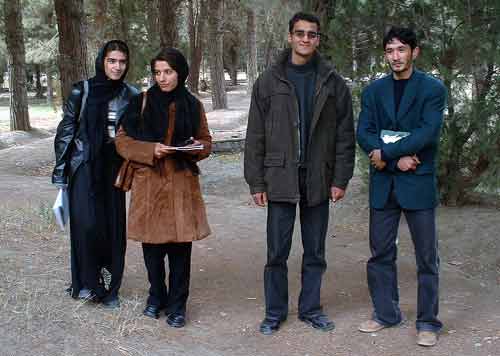 Kabul
University is located in a big and beautiful campus area east of the city
centre. The University was started already in 1931 during the rule of
King Nadir Shah, and it played a major role
for the development of the Afghan society up to 1979. During the 20 years
of Soviet occupation, and civil war, the standard however severely declined,
mainly because most proficient scholars fled the country. And for those
who remained the isolation from the outside World meant that the development
in research stopped completely.
Kabul
University is located in a big and beautiful campus area east of the city
centre. The University was started already in 1931 during the rule of
King Nadir Shah, and it played a major role
for the development of the Afghan society up to 1979. During the 20 years
of Soviet occupation, and civil war, the standard however severely declined,
mainly because most proficient scholars fled the country. And for those
who remained the isolation from the outside World meant that the development
in research stopped completely.
Some of the buildings are in poor shape, but actually we
did not see any concrete war damages. And outside almost every single
faculty building signs stand today, signalling that cooperation projects
with foreign countries (mostly Germany) are under way to rebuild the institutions.
Sweden however is absent in these projects.
What also struck our eyes was that we did not see a single book in any
of the rooms of the ordinary professors or deans we visited.
The university’s winter vacation had already started for most students.
Some examinations were however still held, so a small number of students
were present on the campus (like the students of Economics in the
photo above).
Unfortunately we could not meet the Chancellor for Kabul
University, Prof. M Akbar Popal, who has
taken a great interest in improving the standard of the university and
is a driving force in opening up exchange programmes with universities
around the World. We sat waiting for over an hour in his waiting room,
along with a women reportage team from the Times
Educational Supplement in London, working on a feature on Kabul University,
and its new computer training courses. But we finally had to give up,
as Prof. Popal was still busy with appointments. We had a small chat however
with the Director of President’s Office, Mr. Akram
Mukthar, who acts as an assistant to the Chancellor.
We returned the following day and tried to fix an appointment with Prof.
Popal through the university’s secretariat, but his schedule turned
out to be totally full for the day. Well there is nothing strange with
this. Exactly the same thing would probably happen if we had tried to
make an unexpected visit to the Vice-Chancellor of any Swedish university.
This time we met another British resident in the waiting-room, Tim
Eyres from Oxford, working as Programme Manager at Kabul University’s
newly established English Resource Centre.
Meeting with Prof. Gul Rahman Hakim, Dean of the Faculty of Education
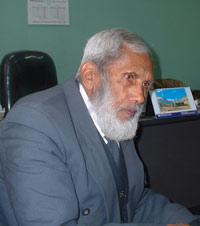 Instead
we headed straight for the faculties. Our first meeting was with Prof.
Gul Rahman Hakim, Dean of the Faculty of
Education. He is a psychologist by training, with a PhD from an Indian
university, and has worked at Columbia University in New York.
Instead
we headed straight for the faculties. Our first meeting was with Prof.
Gul Rahman Hakim, Dean of the Faculty of
Education. He is a psychologist by training, with a PhD from an Indian
university, and has worked at Columbia University in New York.
The faculty which encompasses teaching of pedagogics, psychology and social
sciences, was in the pre-communist days organized in three sections, one
for the social sciences, one for the natural sciences, and one for administation.
The communist government after 1978 changed the system, and divided the
faculty into two departments only, one for pedagogics, and one for psychology.
Now the faculty will return to the original three-tier division and at
the same time use the American university system as a model. Today the
priority set in the faculty is to produce competent teachers trainers
and administrators.
Currently, the Faculty has 300 students and 18 teachers,
of whom 12 are very young (eight men and four women) and lacking even
a Masters degree. There is also a major problem with language proficiency,
most of the faculty is poor in English and would have to attend intensive
courses before qualifying for a Masters course abroad.
Prof. Hakim has been in touch with Pia Karlsson
and Amir Mansory from the Institute
of International Education (IIE), at Stockholm University, while working
on their joint PhD thesis project titled ”Islamic and 'Modern'
Education in Afghanistan – Also for Girls?”.
He would welcome an opportunity to send some of his staff abroad for Masters
courses in Pedagogics, etc. Prof. Hakim specifically points out the utmost
necessity to train the Afghan students in methodology, and the art of
learning how to do research. Knowledge that is non-existent in Afghanistan
today.
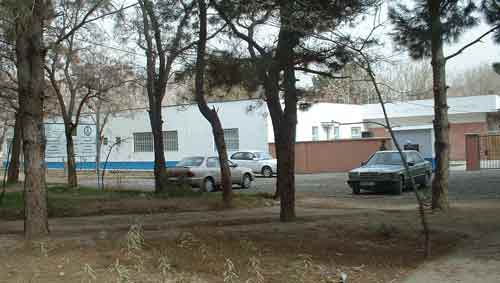 Visit
to the National Centre for Policy Research at Kabul University
Visit
to the National Centre for Policy Research at Kabul University
We then visited the National Centre for Policy Research,
established as recently as January 2003. There we met Mr. Mohammad
Bashir Ahmadzai, Project Assistant Administrator, and Mr. Werner
M. Prohl, Konrad-Adenauer Stiftung Country Representative.
The Centre, financed by the German private foundation Konrad-Adenauer
Stiftung, was set up with the specific political purpose to promote
democracy in Afghanistan. The way to do this is augment the capacity of
social scientists at Kabul University to do research. As such the Centre
is autonomous in relation to the faculties at Kabul University, and the
salaries are paid by Konrad-Adenauer Stiftung.
The centre has three departments:
• Dept. of Law and Political Sciences, headed by Prof. Qazi
• Dept. of Economics, headed by Prof. Seihun
• Dept. of Social Sciences, headed by Prof. Nasreen Gros
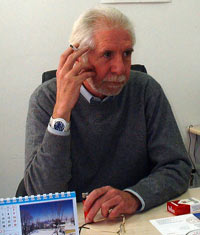 The
heads of the departments are permanently employed. The ambition is that
research should be carried out by Afghanis themselves, and not by foreign
experts. Mr Werner Prohl (photo to the left) said that they are
well aware of the present lack of research consciousness among the academics
at Afghani universities, and the need for this to be adjusted. But the
German financiers do not see this as a short-term project, but instead
take on a long-term view (20–25 years) on the funding of the institute,
just like they do in all International projects they decide to get involved
with. We asked if they have contacts with the Afghanistan Research and
Evaluation Unit, AREU, that we visited the day before (see
our report). They know about AREU, but there have so far been no formal
contacts between the two centres.
The
heads of the departments are permanently employed. The ambition is that
research should be carried out by Afghanis themselves, and not by foreign
experts. Mr Werner Prohl (photo to the left) said that they are
well aware of the present lack of research consciousness among the academics
at Afghani universities, and the need for this to be adjusted. But the
German financiers do not see this as a short-term project, but instead
take on a long-term view (20–25 years) on the funding of the institute,
just like they do in all International projects they decide to get involved
with. We asked if they have contacts with the Afghanistan Research and
Evaluation Unit, AREU, that we visited the day before (see
our report). They know about AREU, but there have so far been no formal
contacts between the two centres.
The National Centre for Policy Research offers scholarships
to Afghani researchers for carrying out Masters and post-graduate studies
in Germany. But even here, Mr Prohl points out, it is still difficult
to find suitable candidates for scholarship programmes. Four German universities
are involved in these programmes, and the goal is to establish working
PhD sandwich programmes between these German institutions and the University
of Kabul. A working PhD sandwich programme in Economics has already been
evolved in cooperation with the University of Bochum.
Mr. Prohl does not fear that the students going out for studies will stay
on in Germany after completing their studies. Those who get an opportunity
of going abroad for higher studies will definitely prefer to return to
good, high-status positions in Afghanistan rather than staying on in Germany,
he argues.
A number of research projects have been initiated at the
Centre, for example on “The Development of Democracy in Afghanistan”,
“Trade relations with Central Asian countries”, “Rule
of Law in Afghanistan”, and “Disarming militias as
a precondition for Peace in Afghanistan”. These projects engage
roughly 80–90 lecturers from various faculties of Kabul University.
They are engaged for 6 – 12 months on a part time basis. The remaining
time they continue to teach at their ordinary departments, where they
have their permanent employment.
As the Centre does not expect valid research results in the short run
they also plan for in-training of the researchers at Kabul University,
teaching methodology and the practice of research. For that purpose seminars
will be held in Kabul with German professors coming here. The first one
is planned to be held in March 2004, and 80–90 KU lecturers from
the three departments who are not properly trained to do research will
take part in the seminar.
Meeting with Prof. M. Daud Rawosh, Dean of the Faculty of the Social Sciences
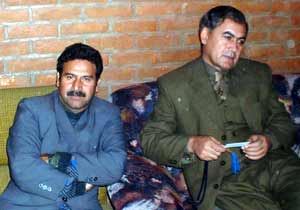 Our
third meeting was with Prof. M. Daud Rawosh,
Dean of the Faculty of the Social Sciences (to the right on the photo)
and Mr. Pohandoie Ahmed Zia Nickben, Head
of the Philosophy Department in the faculty. Both of them are educated
in philosophy.
Our
third meeting was with Prof. M. Daud Rawosh,
Dean of the Faculty of the Social Sciences (to the right on the photo)
and Mr. Pohandoie Ahmed Zia Nickben, Head
of the Philosophy Department in the faculty. Both of them are educated
in philosophy.
Prof. Daud Rawash completed his higher studies with a PhD in 1993 at the
Patrice Lumumba University in Moscow – now renamed the Peoples'
Friendship University of Russia (PFUR).
When he returned to Afghanistan the situation was very volatile in Kabul,
so instead he taught for some years at the Balkh University in the northern
Afghan city of Mazar-e-Sharif. The Balkh
University, the second largest of Afghanistan with faculties in medicine,
engineering, economics, journalism, literature, law and science, was mostly
unaffected by the long war, and only came into trouble after the Taliban
take-over of north Afghanistan. Prof Rawash then fled to Islamabad, Pakistan,
and in 1997 he became involved in setting up a college for Afghan refugees.
He returned to Afghanistan after the liberation from the Taliban in late
2001, and started to work at Kabul University.
The Faculty consists of several departments; the subjects
include sociology, anthropology/ethnology, history, modern history, archaeology
and political science. There are however presently not a single teacher
in the disciplines of sociology and modern history. All courses run are
at an undergraduate level, but the ambition is to be able to start also
an MA programme.
Prof. Rawash complained that the standard of the faculty right now is
deplorable. The faculty staff consists of 35 persons, out of whom ten
are professors. Most of these are old – according to Prof. Rawash
that means 45 years and above – and besides not really qualified,
lacking even Masters degrees. Only four of the professors at the faculty
have PhD degrees besides himself; one from Iran, one from USA, one from
Bulgaria, and one from Uzbekistan (during the time of the Soviet Union).
It means that even the professors should in fact need further education
in order to increase the standard of their teaching, but Prof. Rawash
sees no prospects for such a possibility, as few foreign universities
would accept elderly people for Masters programmes. And even if it became
possible it would not be a very good affair for the Kabul University as
they could not be expected to work more than few years thereafter. Instead
the faculty should invest in sending every year four of its younger teachers,
below 30 years, for higher degrees abroad. Prof. Rawash proposes that
one of them should be in the field of History, and the other three from
philosophy and sociology.
No formal collaboration with any foreign university exists so far, but
discussions are under way with universities in Italy, and also with the
Strassbourg University in France.
Mr. Nickben who heads the
Philosophy department was not very conversant in English, but was able
to inform us that he had completed a Masters degree in philosophy at Kabul
University in 1984, and he then had continued to work at the university
during all the troublesome years.
Other teachers however left the country, and Prof Rawash gave us the names
of some of his former colleagues, the sociologists Mr. Farid
Noory and Mr. Anwar Arman, who now
live in Sweden. Besides he mentioned two Kabul University economists,
Mr. Omr, and Mr. Sohilla,
also now staying in Sweden. We decided to search for them after returning
to Sweden.
Ministry of Rural Rehabilitation and Development
In the afternoon we made an attempt to meet Dr. Omar Zakhilwal, at the Ministry of Rural Rehabilitation and Development (involved in the forthcoming Afghanistan country report from the UNDP). Zakhilwal is an Afganistan Studies researcher, and a friend of Mr. Ahmed Ghulam at the Department of Islamology at Lund Unversity. It turned out however that Dr. Zakhilwal was abroad.
Evening with Swedish experts
The Swedish Counsellor and Sida representative in Kabul Mr. Jörgen Persson and his wife Shireen Persson (originally coming from Sri Lanka, working for the Swedish NGO Save the Children) had invited us for dinner along with:
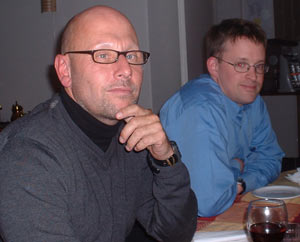 •
Mr. Oscar Schlyter, Political Advisor, Office
of Special Representative of the European Union for Afghanistan (photo,
to the right). A young man who joined the Swedish Foreign Service
(the Afghanistan desk) after writing a Masters thesis at the Dept.
of Political Science, Stockholm University, in the Spring 2001 on
the Taliban movement. The thesis was named ”Securitising Afghanistan.
Regional security and the rise of the Taliban”.
•
Mr. Oscar Schlyter, Political Advisor, Office
of Special Representative of the European Union for Afghanistan (photo,
to the right). A young man who joined the Swedish Foreign Service
(the Afghanistan desk) after writing a Masters thesis at the Dept.
of Political Science, Stockholm University, in the Spring 2001 on
the Taliban movement. The thesis was named ”Securitising Afghanistan.
Regional security and the rise of the Taliban”.
He is now working for one year as an advisor to the EU representative
in Afghanistan Vandrell. More
information on EU's relations with Afghanistan.
• Dr. Staffan Darnolf, Election Administration Specialist, International Foundation for Election Systems (photo, to the left). Consultant working for one year to prepare the presidential elections that are scheduled to be held in Afghanistan in the Summer 2004.
• Dr. Björn Odin, the Institute for Personnel and Corporate Development (IPF), an autonomous academic body working with management training, development programmes, corporate and personnel strategies, future and environment studies, research and assessment studies, wholly owned by Uppsala University, and with staff members all having an academic education within the behavioural and/or social sciences. Björn Odin was now in Afghanistan with a mission to write a curriculum for primary schools in Afghanistan.
SASNET - Swedish South Asian Studies Network/Lund
University
Address: Scheelevägen 15 D, SE-223 70 Lund, Sweden
Phone: +46 46 222 73 40
Webmaster: Lars Eklund
Last updated
2009-03-17
